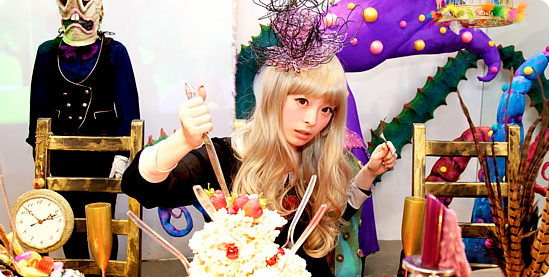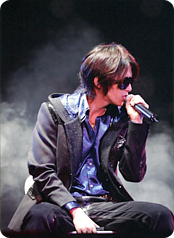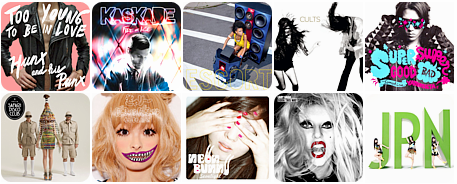The state of East Asian pop music can now be summed up in three words: South Korean. Dubstep. What once seemed a sort of hip novelty has quickly become the most irritating trend that refuses to die softly. It’s greatest example, Hyuna’s “Bubble Pop!” is a prime example of what can make it so difficult to care about: unlike miss A’s expert weave of electro house in album Touch, “Bubble Pop!” strives for at least three different genres without providing any glue. But I’m getting ahead of myself. I’ve missed a lot. And I’m going to make up for it by talking about three or four of my favorite, least favorite, and most interesting musical moments of 2011, April onwards; blink and you’ll miss the Cut Copy reference.
Yasutaka Nakata, etc.

There are a couple of different ways to approach some of the best music that was released in 2011, and Yasutaka Nakata’s work is as good a place as any to start. Yes, Perfume’s JPN was annoying in all the ways it was the best: as long as you didn’t think too much about how it was mostly a singles collection with very little original material (and everyone did), it’s really a generous serving of everything Nakata does so well, without all the annoying self-involved navel-gazing that can happen on albums like STEREO WORXXX.
Kyary Pamyu Pamyu also happened this year, in case you didn’t know. And though it’s a shame one of her songs ended up on JPN, she still brings something quintessentially Japanese to the mix. I guess I’d like to believe that everything she does is tongue-in-cheek, which makes what she has to say about being Harajuku’s fun house mirror that much more worthwhile. But even if it wasn’t, there is nothing ambiguous about what she, or Perfume are doing. The titles of the albums (JPN and Moshi Moshi Harajuku) are homages in themselves, proud labels that no Korean pop star wants to stick on themselves. Yes, Perfume is on a major label now and Kyary seems to have made some kind of inconsequential mark on Scandinavia, but these aren’t artists trying to do or be anything different than they already are. This is Japan. This is our pop music. Irrashaimase.
South Korean Pop Music

K-pop is everywhere: it’s on The Singles Jukebox, it’s being championed by rock critic Frank Kogan, it’s on David Letterman, it’s being analyzed and dissected in really awesome, really smart ways all around the web. And that 2NE1 video! Best pop song of the year? You don’t say! It’s amazing how much effort has been put into making K-pop a thing and how quickly it’s caught on when compared to the months and years and decades that Japanese pop/rock has tried to crawl into the market (J-pop could take a note here and there). Then again, it’s also amazing how long Korean pop music has actually been around, and how little anyone seems to think it existed pre-2NE1.
Yet I love how exuberant and free of burden all of the songs seem to be: they are unfettered by turmoil or angst or the general day to day shitstorm of life. In some ways, this creates quintessential pop narratives, even when it’s bizarre and sometimes tasteless. It’s the type of sound that practically begs you to feel guilty, and if I believed in guilty pleasures, I might feel somewhat paranoid about my enthusiasm for stuff that still kind of makes me cringe sometimes.
Still, for every Big Bang and 2NE1 and “Hot Summer” and “Oh! Honey,” we get “Bubble Pop!” and “FACE” and a neverending series of Japanese language crossovers. I like Korean pop, and as anything I really like, I want to see it grow and evolve and stop resorting to dubstep breakdowns or cliche representations of gender. I want to see it go beyond crafting brilliant dance singles to craft one, just one, slow song that doesn’t sound like it was written for Toni Braxton in 1994. One of my top ten albums of the year was a Korean pop album, but it wasn’t one you’ve probably heard much about: it’s Neon Bunny’s Seoulight and it was not performed on Inkigayo or accompanied by a career-defining music video. It has no trademark single easily recognizable by a syllable or phrase: it’s just a great album, made up of more than mostly filler. There’s a lot of debate about K-pop’s longevity, it’s ability to really go anywhere, but whether or not it continues to crop up on Pitchfork or simply recede into its own home field niche market, is irrelevant: we’ll always have 2011.
Group Therapy

2011 was also pretty great for EDM of any kind: if at some point you considered yourself a music fan this year, you probably heard it somewhere, even if what you heard was just pop music’s appropriation. My favorite song of the year was probably Above & Beyond’s “Sun & Moon.” But the most disappointing album of the year (besides Cut Copy’s Zonoscope) was Group Therapy, the album on which it was released. When you coin a defining phrase for a genre, practically renaming that genre in the process, there’s a type of pressure so immense it threatens to collapse on itself. Group Therapy wasn’t a terrible album, it just wasn’t as epic as it should have been. Or rather, it wasn’t as therapeutic as its live component was meant to be — enough that speaking about seeing the group live on the North American leg of their “Group Therapy Tour” makes me a bit uncomfortable.
There were a lot of albums this year that seemed to be just a little less ambitious than advertised: Shonen Knife’s Osaka Ramones was supposed to be a fun covers album, instead it was just another useless, mediocre version of songs that don’t need any improving, remixing, or alternate versions. Ayumi Hamasaki’s FIVE, “BRILLANTE” aside, is now that mini-album sandwiched between what are now two really interesting albums (whether they are conventionally bad or good is irrelevant). I liked Hunx and His Punx’s Too Young to Be in Love and Mind Spiders’ self-titled debut, but these are not albums I have given much thought to since the year ended. Yet I still think about Hamasaki’s impromptu marriage and her sincere belief in its grit, this album, Love songs, that is so clearly written for and about it, and then, last month, Party queen, and how quickly we are able to change our minds, and not bother to suffer over it.
In a way, trance music is the best place to tread this territory, as it’s probably some of the saddest music you’ll hear. There’s a lot of crossover between electro and prog right now, a lot of stuff like BT & Adam K’s “Tomahawk” that illuminates whole new corners that EDM has forgotten to scavenge, but there is still the “Never Let Me Go“s next to the “Let Go“s and the “Never Go Back“s with the “Start Again“s. It’s in this frame where it becomes visible that sometimes Group Therapy tries so hard to make a statement that it forgets to say anything. It also forgets its own purpose in the process: trance music is meant to be played to massive crowds and a sea of bodies so dense, one’s life is threatened by an enthusiastic groover’s elbow. For an album summing up what makes the genre so unique, so all-encompassing, there’s a lot of shuffling self-reflection, a lot of time spent alone among the aural equivalent, with minimal instrumentation and lyrics that sometimes border on the nonsensical. Though it succeeds in avoiding the sometimes too-literal weakness of vocal trance, it fails to capture what the lead singles so simply summed up in a few lines: I’m sorry. I’ll never get over you. I won’t forget about the people I love. This song is going to help me. That’s what music does.
Speaking of the Power of Music

Ayumi Hamasaki’s concerts haven’t exactly been the stuff of legend lately. They’ve just been a lot like what everyone else is doing with more useless dance interludes (really, it doesn’t take that long to change an outfit). But after the earthquake in March, she decided to nix the “~HOTEL Love songs~” thing (a full-blown concept based around the idea of her and at-the-time husband Manny, I’m guessing) and bring it back to the one thing she seems to be forgetting about lately: her music. The “POWER of MUSIC” live is Hamasaki at some of her finest diva moments (even though her vocals aren’t always up to the challenge). There’s a simple stage set up in what alternately resembles a roulette wheel and a giant record player with some moving pieces here and there, but that’s about it. Songs get whole new arrangements or take their cues from classical versions we’ve heard from previous remixes. There’s minimal monologuing, which is always appreciated. The song choice is a little dubious, but it’s more a chance to show off how lasting and epic Hamasaki’s back catalog is: it’s a huge pay-off for long-time fans who have context and experience to witness how thrilling it still is to hear “Boys & Girls” live or how huge “A Song is born”‘s leap can be from one continent’s tragedy to another. There were rumors a while back that this might be turned into a live album, and for Hamasaki’s first and only live album, I don’t think Avex could go with a better choice. It’s pretty seminal in its own way, complete without being overwhelming, stripped down without losing its lushness. And also, she looks like a goddess, so there’s that.
 It’s the opposite from my other favorite concert released in 2011, Tomohisa Yamasahita’s “Asia Tour 2011 SUPER GOOD, SUPER BAD.” Where Hamasaki brings herself and the crowd to tears, choking up lyrics like they’re repressed memories, I’m fairly certain there is not a single song Yamashita actually sings live. It’s two hours of really incredible Japanese pop music, bereft of audience banter and any kind of actual emotion. I don’t know why this concert happens to work, but Yamashita is actually a fairly superb performer. No, not exactly the type of guy who will happily run through all the concert gimmicks while refusing a paycheck for the encore, but certainly a professional entertainer. The outfits are a bit Justin Timberlake circa N’Sync, yet I am still all about feeling this man in his jewelry or whatever the hell that line in that amazing song that has yet to have a studio release is (seriously, help me out): but he had an incredible dual album of the same name, a duet with Namie Amuro, and hasn’t been around for two decades, so he’s someone to look out for.
It’s the opposite from my other favorite concert released in 2011, Tomohisa Yamasahita’s “Asia Tour 2011 SUPER GOOD, SUPER BAD.” Where Hamasaki brings herself and the crowd to tears, choking up lyrics like they’re repressed memories, I’m fairly certain there is not a single song Yamashita actually sings live. It’s two hours of really incredible Japanese pop music, bereft of audience banter and any kind of actual emotion. I don’t know why this concert happens to work, but Yamashita is actually a fairly superb performer. No, not exactly the type of guy who will happily run through all the concert gimmicks while refusing a paycheck for the encore, but certainly a professional entertainer. The outfits are a bit Justin Timberlake circa N’Sync, yet I am still all about feeling this man in his jewelry or whatever the hell that line in that amazing song that has yet to have a studio release is (seriously, help me out): but he had an incredible dual album of the same name, a duet with Namie Amuro, and hasn’t been around for two decades, so he’s someone to look out for.
Finally, “Perfume Live @ Tokyo Dome” was more a victory lap, but it was still super fun. There’s some cool lasers and minimal fireworks at the end during “POLYRHYTHM” (which, if this doesn’t provoke some sort of welling up of emotions, either because you are a huge fan and seeing Perfume play the Dome is a sort of triumph you can share in, or because they hit those ‘works at just the right moment, when you’re exhausted from just watching all three of them sweat it out in dance routine after dance routine, and you’re forgetting how many songs there are in their discography but damn, “POLYRYTHM” is still one of the greatest pop songs ever put to sound system and it’s just so lovely), but it’s Perfume, and it’s still pretty amazing how far they have come and how far they can still go.
Oh and one more thing
“Born This Way” is a great album. Even after all that squawking about herself during endless concert monologues, and that annoying title track, there is something fundamentally wonderful about Lady Gaga’s album. There are open roads, confessional bar stools, heavy metal lovers, and a sheisse on top of it. Juggling Christian metaphors, big Broadway numbers, and teenage punks running around with their parents’ hard-earned money is almost more than one album can take, but Born This Way‘s single failure of trying on too many things at once is like saying that human beings are failures for doing the same. This is Gaga’s statement album, and beneath the ode to an ex-boyfriend that seems to choke every song, there is also some pretty fallible, ugly, and beautiful music.
Without further ado, here are my “best of” lists for 2011.

Top Ten Albums of 2011
01. Perfume: JPN
02. Lady Gaga: Born This Way
03. Neon Bunny: Seoulight
04. Kyary Pamyu Pamyu: Moshi Moshi Harajuku
05. Yelle: Safari Disco Club
06. Tomohisa Yamashita: SUPERGOOD, SUPERBAD
07. Cults: Cults
08. Escort: Escort
09. Kaskade: Fire & Ice
10. Hunx and His Punx: Too Young to Be in Love
